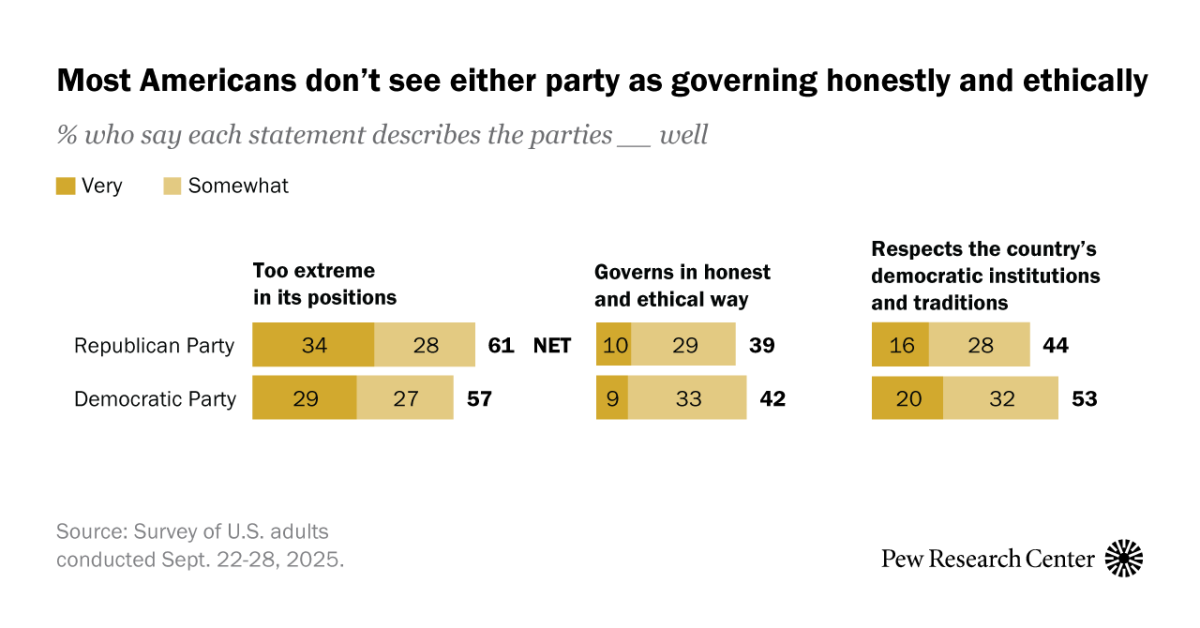Copyright pewresearch

With the 2026 midterm elections a year away, neither the Republican nor Democratic Party is widely seen as having good ideas. And both are viewed by majorities as too extreme and not governing honestly and ethically: 39% of Americans describe the Republican Party as governing ethically and honestly – and about the same share (42%) say this about the Democratic Party. Majorities continue to view both parties as too extreme in their positions – though more apply this to the GOP (61%) than the Democratic Party (57%). Majorities are also frustrated with both parties, and about half say each makes them angry. A Pew Research Center survey of 3,445 U.S. adults conducted Sept. 22-28 (just before the now monthlong government shutdown) also finds that just 36% say the Republican Party makes them feel hopeful, with even fewer (28%) saying this about the Democrats. Frustration runs particularly high among Democrats and Democratic-leaning independents, who are frustrated not just with Republicans – who control the White House and both chambers of Congress – but with their own party: 67% of Democrats say their own party makes them feel frustrated in the September survey – far higher than the roughly half who said this in 2021 and 2019. Asked the main reason for their frustration, the dominant pre-shutdown response of frustrated Democrats (41%) is that the party has not pushed back hard enough against the Trump administration. In contrast, Republican frustration with the GOP is far lower than in 2021: 40% of Republicans and Republican leaners say they are frustrated with their party. And 69% now say the party makes them feel hopeful. The survey explores several aspects of public attitudes about the two major political parties, including: How Americans feel about the Republican and Democratic parties (Chapter 1) How Americans see the parties on key issues (Chapter 2) What Americans want and expect from party leaders (Chapter 3) How well the parties represent Americans’ interests (Chapter 4) The parties and key issues The Republican Party continues to have a clear edge on crime and immigration policies – two hallmarks of President Donald Trump’s first year back in the White House. By 17 percentage points, more Americans say they agree with the GOP than the Democrats (45% vs. 28%) when it comes to crime policy – a larger Republican edge on this issue than two years ago. The Republican advantage on immigration policy stands at 9 points (44% vs. 35%), essentially unchanged since 2023. By comparison, Republicans’ advantage on the economy has largely eroded since 2023. Today, 38% of Americans say they agree with the Republican Party on policies to deal with the economy, while nearly as many (35%) agree with the Democratic Party – a narrow 3 percentage point advantage. Two years ago, the GOP had a 12-point advantage on this issue. The Democratic Party, in contrast, continues to hold advantages on policies concerning health care, the environment and climate, abortion, and race. But Americans are now about equally likely to agree with the Republican and Democratic parties when it comes to policies affecting people who are lesbian, gay and transgender – a shift from recent years. Today, 37% say they agree more with Democrats on this issue, while 35% agree more with Republicans.The Democratic Party held an 8-point edge on this previously (37% in 2023 to 29% today). For more about how the public views the parties on issues, read Chapter 2. Other key findings A quarter of Americans say that neither party represents their interests particularly well. Overall, 42% say the Republican Party represents people like them at least somewhat well, and a similar share (40%) says this about the Democratic Party. However, as has been the case for the last several years, about a quarter of Americans don’t see themselves represented well by either party. For more about how well people feel the parties represent them, read Chapter 4. Democrats’ frustration with their party centers on the feeling that it is not pushing back hard enough against Trump and his administration. About four-in-ten frustrated Democrats (41%) describe this as the main source of their frustration. Many other answers hit on related themes: 13% offer criticisms of the Democratic Party’s leadership, while 10% point to a lack of a cohesive message or agenda. Related: Americans view Trump, Vance and congressional leaders in both parties more negatively than positively Large shares of Americans say they agree with neither party on two of the central foreign policy issues today – the Israel-Hamas conflict in Gaza and Russia’s invasion of Ukraine. Nearly half (46%) – including 52% of Democrats and 36% of Republicans – say this about the Israel-Hamas conflict. More than a third (36%) say the same when it comes to Russia and Ukraine. (Note: This survey was fielded before the early October deal between Israel and Hamas.) Both Republicans and Democrats are divided over whether the party should accept members who call opponents “evil.” Over four-in-ten in both parties say their party should be somewhat accepting of this, while narrow majorities say it should not. But overwhelming shares in both parties say officials who advocate violence against the other party should not be accepted. Most continue to see large differences between the two parties. Six-in-ten Americans say there is a great deal of difference in what the Democratic and Republican parties stand for, and another 27% say there is a fair amount of difference between the parties. Only 12% say there is hardly any difference at all in what the parties stand for. Most Republicans and Democrats say it’s very important for the other party’s elected officials to compromise with officials in their party to solve problems. As in the past, wide majorities of Democrats (78%) and Republicans (71%) say it’s very important for the other party’s politicians to compromise with those in the party they support. But fewer than half in either coalition (46% of Democrats, 39% of Republicans) place the same level of importance on their own party’s elected officials compromising with those on the other side.



